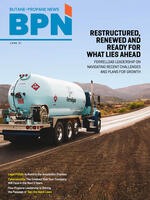
The last several decades have seen dramatic advances in technology as computers, large and small, have become an essential part of our everyday lives. Every device, it seems, comes equipped with computer chips that control operation, collect data and even communicate with other devices.
These developments are certainly evident in the propane industry. GPS systems track company vehicles and assist drivers in locating customers and making deliveries. Computers can track degree days and project delivery dates for keep-full customers. Cell phone cameras can now efficiently document customer installations. The list goes on.
The Gas Detector Example
But in addition to these benefits, tech has the potential to impact the propane retailer’s legal duties and obligations. An example of this is the electronic gas detector. Odorization of propane as a means of alerting customers to potentially hazardous leaks has been around since the founding of the industry itself. It’s a system that has worked well.
However, beginning in the early 1990s, aggressive plaintiffs’ lawyers (seeking new avenues for recovery of large damage awards in court against propane retailers) began to advocate electronic gas detectors for installation at customer locations. Odorization, they claimed, is inadequate on its own to warn customers of leaks. Electronic detectors, they argued, are a necessary supplement to gas odorization.
PERC Brochures
There has been much controversy about the claims of the plaintiffs’ attorneys. Electronic gas detectors are far from perfect. But over the course of the decade, propane retailers were subjected to multiple lawsuits alleging that retailers should advise customers about gas detectors and even require them at customer installations.
This attempt by plaintiffs’ attorneys to turn new technology against the propane industry has largely been neutralized by the customer safety literature developed by the Propane Education and Research Council (PERC) starting in 2005. Among other things, these safety brochures advise customers, in clear and understandable terms, about the availability of electronic detectors as a possible supplement to odorization.
Neutralizing the Attack
The PERC literature, combined with the widespread availability of detectors (they can now be purchased at a reasonable cost in most hardware stores or online), has largely neutralized the gas detector attack by the plaintiffs’ bar.
Retailers who provide the PERC brochures, or their equivalent, to their customers are well positioned to defeat this kind of claim. To date, no court or jury has endorsed the claim that retailers must provide detectors to their customers.
However, the electronic gas detector is unlikely to be the last new technology to present legal challenges for the industry. One indicator of what the future may hold can be found in the residential gas meter which, although rarely used in the propane industry, now incorporates computer technology that may be a signal of things to come for suppliers.
Smart Meters
A gas meter, of course, measures a customer’s gas usage, usually in cubic feet, for billing purposes. Natural gas utilities used to employ squadrons of meter readers, whose job it was to visit each customer location and visually read the gas meter for billing purposes — not anymore. Modern meters, often called “smart meters,” record usage data on a computer drive in the meter.
The data is then wirelessly collected by employees driving through the area or is conveyed wirelessly to the gas company directly by the meter. Modern gas meters can collect and record usage information on an hourly basis, or perhaps even more frequently. This ability of the modern gas meter to collect and transmit information can impact the legal duty of care owed by the gas company to its customers.
Knowledge of a Leak
The context of all of this is the gas leak that occurs in the customer’s piping and appliances — downstream of the meter (or point of delivery). The accepted rule is that the gas supplier has no legal responsibility for leaks and resulting fires and explosions that occur in customer-owned piping that it did not install or inspect. The gas supplier has no ownership or control over such equipment, and the law will generally not impose liability on the supplier for leaks that occur in it. However, there is an important exception to this rule.
If a gas supplier has knowledge of a leak in customer piping, it generally must take action to find the leak and either repair it or turn the gas off so the customer can have someone else repair it. Some states have expanded this duty so that it is triggered not only by actual knowledge of a leak, but also by “constructive” knowledge of a potential leak or hazardous condition.
Constructive knowledge generally means that someone is aware of facts that would lead a reasonable person to believe that there is a leak, potential leak or hazardous condition. State law varies on this, so it is always best to consult the law in a retailer’s state or states of operation for a definitive answer.
Triggering a Duty
Historically, the propane retailer can have knowledge of a leak (or potential leak) if the customer calls to report a gas odor or if it tests the customer’s piping for leaks and it does not hold pressure. Over the years, plaintiffs’ attorneys have also invoked a physical inspection of the customer’s piping and appliances as providing actual or constructive knowledge of a leak or hazardous condition.
The existence of computerized equipment, such as the modern gas meter, has prompted plaintiffs’ lawyers to explore a new avenue for the imposition of liability on the gas supplier. If a meter collects hourly usage data at a customer location and transmits that data in real time to the gas supplier, can that trigger a duty to take action on the part of the gas supplier? If the usage data suggests a potential gas leak, is the supplier obligated to respond just as if the customer called to report a gas odor? Is the supplier obligated to interpret the raw data collected by these smart devices? Next month, we will review a recent lawsuit against a natural gas supplier that raises just these questions.


